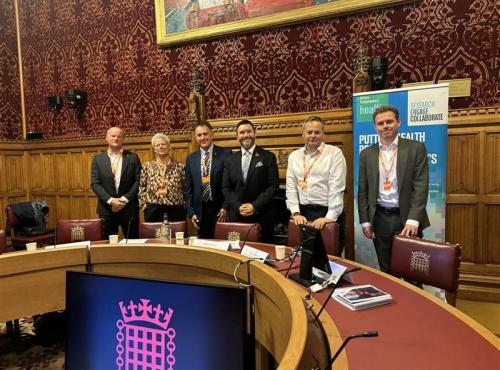Removing competition from the English NHS: three starter questions
By Dr Mary Guy, author of Competition Policy in Healthcare and “Between ‘going private’ and ‘NHS privatisation’”
On 24th March this year Karin Smyth MP chaired a session of the All-Party Health Group hosted by Policy Connect to examine the key themes, opportunities and challenges in the Government’s White Paper Integration and Innovation: working together to improve health and social care. I was pleased to contribute to the discussion, and have three key follow-up questions for the government to address.
First, a bit of background. In its first report, in May 2021, into the Government’s February 2021 Health and Social Care Bill White Paper, the Health and Social Care Committee expressed support for the proposals to reduce bureaucracy. The Committee particularly commented positively on the commitment to amend the Health and Social Care Act 2012 (HSCA 2012), including to remove the involvement of the Competition and Markets Authority (CMA). This proposal in the White Paper is likely to prove popular more generally, as evidenced by the positive responses provided to the Committee’s inquiry from within and outside the NHS.
The competition provisions in the HSCA 2012 framework drew inspiration from New Labour choice and competition policies. The intentions underpinning the framework may have been laudable – to ensure choice for and responsiveness to patients. But the arrangements proved complex, with the involvement of both the CMA and NHS Improvement, and with a licensing regime introduced to regulate delivery of NHS services by NHS and private providers. Things were further complicated by Department of Health oversight becoming diffused between the CMA, NHS Improvement and NHS England.
This convoluted framework proved difficult to implement, and appeared capable of uniting both those opposed to, and in favour of, competition in healthcare. It is not surprising therefore that subsequent to the enactment of the HSCA 2012 and the move towards integrated care systems, a series of workarounds and compromises emerged. These included the acknowledgement by the CMA in 2017 that competition “…currently plays a limited role in the NHS and is not the basic organising principle for the provision of NHS services”.
Given the gap between good intentions and poor execution around the HSCA 2012 framework, it is not surprising the Health and Social Care Committee’s May report notes that for the upcoming set of changes it is “extremely important to make sure implementation is well executed”.
The devil will be in the detail, and it is essential that any reassuring gloss of ‘removing competition’ or ‘reducing privatisation’ is not used as a substitute for such detail. If the current proposals to remove competition are to be well executed, this means close scrutiny of the legislation as it develops over the next few months, and asking questions. Here are three:
1. What does removing competition from the NHS actually mean?
Following the HSCA 2012 reforms, there were two clear attempts to remove competition from the NHS: the National Health Service (Amended Duties and Powers) Bill and the National Health Service Bill.
Both Bills proposed the re-establishment of Secretary of State’ oversight, repeal of NHS Improvement’s competition powers, and a recognised framework for protecting the NHS based on exceptions to EU law and the World Trade Organisation General Agreement on Trade in Services (WTO GATS). The current proposals appear to reflect similar aims, but with the crucial distinction that they focus primarily on questions of oversight, rather than the underlying legal framework. So my first warning is that attention to both aspects is needed.
2. What does removing CMA oversight of the NHS achieve?
CMA oversight of the NHS was one of the more controversial aspects of the HSCA 2012 reforms.
The 2021 White Paper provides that “[t]he NHS should be free to make decisions on how it organises itself without the involvement of the [CMA]” (para 3.15). What is meant by this is not clear: despite HSCA 2012 provisions referencing the CMA, its focus with regard to the Competition Act 1998 has consistently been on the private healthcare market, not private providers delivering services for the NHS.
The CMA’s oversight of cases involving NHS provision brought under the Competition Act 1998 has already been significantly curtailed. Secondary legislation introduced following the HSCA 2012 has meant that such cases would be examined by NHS Improvement. The current plans to remove NHS Improvement’s competition functions suggest that any future cases would be handled by private enforcement of competition law via the courts. Would this be a better and less bureaucratic route?
The White Paper states that it “…has become clear that the CMA is not the right body to review NHS mergers” (para 5.42), and proposes to remove CMA oversight of mergers involving NHS Foundation Trusts. If the CMA is not the right body, then who should review NHS mergers, particularly if competition is not the basic organising principle for NHS services? Furthermore, no mention is made of other mergers, such as between private providers, which may have consequences for NHS patients.
So
Within UK merger control, a mechanism exists for the Secretary of State to assume decision-making powers, but this is informed by the CMA. From oral evidence to the Health and Social Care Committee in March 2021, it might be inferred that the Secretary of State for Health and Social Care’s additional powers will include NHS merger review, although the Committee’s report indicates that it is NHS England who will assume the CMA’s former role. The Committee makes positive calls for transparency regarding procurement, and safeguards to avoid politicisation of the NHS via the Secretary of State’s additional powers, but further clarification in the legislation will be needed: who will be responsible for what in relation to the review of and decisions on mergers?
3. What is missing from the current proposals?
There was broad agreement across the All Party Health Group at its March meeting that the White Paper lacks detail. While highly specific information on the removal of competition may only be expected with draft legislation and Explanatory Notes, it’s disappointing that the government has not acknowledged the different context in which the new legislation will have to be developed. The White Paper reflects the NHS Long Term Plan, but this was published in January 2019, and to say that much has happened since then is an understatement.
Responding to COVID-19 included the “major deal” in March 2020 to make independent sector capacity available to the NHS. This is underpinned by secondary legislation and notified agreements which cover not only the “crisis” response, but have facilitated “continuity” of non-COVID-19 services delivery. Although this secondary legislation is intended to provide only a temporary exception mechanism, its duration is defined by the potentially open-ended “healthcare disruption period”. The government has acknowledged the need for ongoing cooperation between the NHS and independent healthcare providers, so it would be helpful to have further clarification of how this exception mechanism will continue to operate.
Finally, connections between Brexit and the current proposals may not seem obvious, but should be considered as part of the new legislation. As the Trade and Cooperation Agreement signed by the EU and the UK government in December 2020 indicates scope for similar exceptions to the EU and WTO law provisions which featured in the aforementioned earlier Bills, how the White Paper proposals engage with these exceptions needs to be elaborated.
The Health and Care Bill introduced in July 2021 reinforces the need for answers to these questions. Already in the Explanatory Notes to the Bill and the Research Briefing, it is clear that misconceptions may set the tone for debates. A clear example sees reference being made to Monitor [NHS Improvement] having a duty with the CMA to ‘promote competition’. While this featured in the White Paper preceding the HSCA 2012, it was removed by the NHS Future Forum during the three-month pause called in 2011 to address controversies surrounding the Lansley reforms. No such duty exists in the HSCA 2012.



